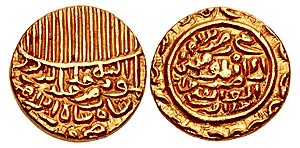Sultanate of Jaunpur (Sharqi dynasty) سلطنت جونپور | |||||||||||
|---|---|---|---|---|---|---|---|---|---|---|---|
| 1394–1493 | |||||||||||
Territory of the Jaunpur Sultanate ("Sharqis" dynasty) circa 1475, with neighbouring polities.[1] In 1479, some part of the Jaunpur Sultanate was absorbed by the Lodi dynasty of the Delhi Sultanate. In 1493 the rest of the Jaunpur Sultanate was annexed by Bengal Sultanate. | |||||||||||
| Capital |
| ||||||||||
| Common languages | Persian (official) Hindavi, Bhojpuri, Awadhi (common) Arabic (religious) | ||||||||||
| Religion | Sunni Islam | ||||||||||
| Government | Monarchy | ||||||||||
| Sultan | |||||||||||
• 1394–1399 | Malik Sarwar (first) | ||||||||||
• 1458–1493 | Hussain Khan (last) | ||||||||||
| History | |||||||||||
• Established | 1394 | ||||||||||
• Disestablished | 1493 | ||||||||||
| |||||||||||
| Today part of | India | ||||||||||
The Jaunpur Sultanate (Persian: سلطنت جونپور) was a late medieval Indian Muslim state which ruled over much of what is now the states of Uttar Pradesh and Bihar between 1394 and 1494.[3] It was founded in 1394 by Khwajah-i-Jahan Malik Sarwar, an eunuch slave and former wazir of Sultan Nasiruddin Muhammad Shah IV Tughluq, amidst the disintegration of the Delhi Sultanate's Tughlaq dynasty. Centred in Jaunpur, the Sultanate extended authority over a large part of the Ganges-Yamuna Doab. It reached its greatest height under the rule of Sultan Ibrahim Shah, who also vastly contributed to the development of Islamic education in the Sultanate. In 1494, Sultan Hussain Khan was defeated by the forces of the Afghan ruler Bahlul Lodi, Sultan of the Lodi dynasty of the Delhi Sultanate at Benares at which point Hussain fled to Kahalgaon in modern-day Bihar where the Sultan of Bengal assigned him a pargana. Here he was allowed to mint his own coins and was promised help from Bengal in recovering his kingdom. He died in 1505.[2]
- ^ Schwartzberg, Joseph E. (1978). A Historical atlas of South Asia. Chicago: University of Chicago Press. p. 148, map XIV.4 (c). ISBN 0226742210.
- ^ a b Hussain, Ejaz (2017). Shiraz-i Hind: A History of Jaunpur Sultanate. Manohar. pp. 76–78.
- ^ For a map of their territory see: Schwartzberg, Joseph E. (1978). A Historical atlas of South Asia. Chicago: University of Chicago Press. p. 147, map XIV.4 (c). ISBN 0226742210.


